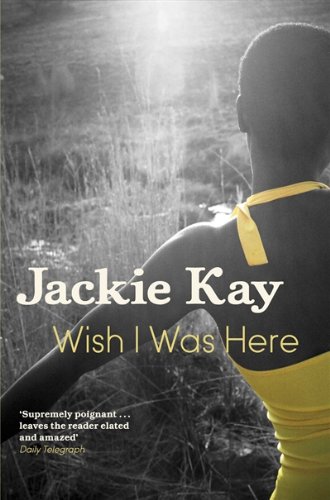
photo by Iván Melenchón Serrano
by Gina Challen
For Jackie Kay, the short story form is like drinking whisky: ‘You can have a wee malt but if you tried to drink a whole pint of whisky you’d be dead, so there’s something about the intensity.’ Like Kay’s malt, a successful short story remains with us long after we read the last line.
The stories in Jackie Kay’s collection Wish I Was Here have this lingering quality. Relationships fracture, people face death, both their own and that of a loved one, characters leave, and characters are left. And if that doesn’t seem miserable enough, a crisis of identity nestles at the heart of every tale. This might seem bleak, but Kay draws on her Scottish heritage to interweave  these central themes of loss, lost love and identity with dialect, gentle idioms and spiky Scotts humour. It is fair to mention she writes a lot about scones, and scones are far from bleak.
these central themes of loss, lost love and identity with dialect, gentle idioms and spiky Scotts humour. It is fair to mention she writes a lot about scones, and scones are far from bleak.
Kay writes with honesty. She focuses on our innermost doubts about ‘self’ with the expertise of a knife thrower at the circus, prompting us to ask, Who am I? Am I worthwhile enough? With Kay, this search for identity is pivotal to her writing and, in Wish I Was Here, her characters wrestle with both who they are and how they are defined by other people. For Maggie, in ‘Not the Queen’, it is an endless struggle to be seen as herself, when she looks exactly the same as the Queen. The narrator reveals that Maggie ‘had the odd feeling when she glanced in the mirror that she wasn’t seeing herself, but the bloody Queen’. Then later, as she considers cosmetic surgery, we are told that Maggie wonders if she has ‘used her face as a scapegoat to cover her own inadequacies’. Whilst the narrator of ‘My Daughter the Fox’ fights for approval not only for her daughter, but for her new identity as a mother, she observes:
With Anya, I felt like there were two lives now: the one before I had her and the one after, and they barely seemed to connect. I didn’t feel like the same person even.
A cry for acceptance runs through the whole collection.
Using her sharp insight, coupled with poetic language, Kay creates emotional connections between her characters and her readers. She lays bare those midnight thoughts that often plague us all. In ‘How to Get Away with Suicide’, Malcolm recognises this familiar, haunting tenet: ‘If you can transform maybe you can live’ – it’s a thought many of us can empathise with. Similarly, in ‘You Go When You Can No Longer Stay’, we stand beside Ruth as she agonises over her own worth. Her love is inexorably cast away, along with the weight her partner, Hilary, sheds. It is easy to agree with Ruth when she remarks, ‘I’ve started to feel very odd within my own life. It’s most peculiar to feel lonely inside your own life’.
As in her poetry, Kay chooses her words carefully. She creates vivid imagery, adroitly nuanced to work on more than one level, and, for a reader, this renders the details  unforgettable and, for a writer, it makes them enviable. These details are the sips of whisky that make up Kay’s ‘wee malt’: the fifteen pairs of thongs ‘lying like thin vipers in amongst a nest of old knickers’; ‘the silence that pads across a loch on a wintery, misty morning in its webbed feet’.
unforgettable and, for a writer, it makes them enviable. These details are the sips of whisky that make up Kay’s ‘wee malt’: the fifteen pairs of thongs ‘lying like thin vipers in amongst a nest of old knickers’; ‘the silence that pads across a loch on a wintery, misty morning in its webbed feet’.
Interestingly, Kay feels that ‘the short story suits people who feel displaced or misplaced or who don’t fit in, people who feel their very bones are lonely’. Whilst she is referring to the reader here, this is very much an ethos that runs through Wish I Was Here. The stories are, after all, about lost souls.
The empathy Kay evokes for all her characters leaves us with a sense that we are in this life together – writer, reader and characters are all very much part of the whole. But it is this togetherness that brings a feeling of hope. As Hamish says, on the very last page of the collection: ‘We are getting through this. There’s absolutely no way we are not going to live to tell this story’. There may be a lot of life to get through, but there is hope as well. In this respect it is a bittersweet collection, as sharp as the ‘nippy’ rhubarb and ginger jam Kay’s characters spread on their scones.

